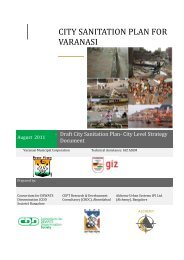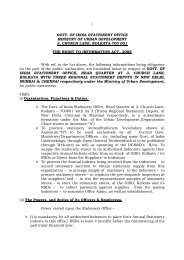CITY SANITATION PLAN - Ministry of Urban Development
CITY SANITATION PLAN - Ministry of Urban Development
CITY SANITATION PLAN - Ministry of Urban Development
You also want an ePaper? Increase the reach of your titles
YUMPU automatically turns print PDFs into web optimized ePapers that Google loves.
<strong>CITY</strong> <strong>SANITATION</strong> <strong>PLAN</strong> BAREILLY<br />
work began, has shown that achieving clean and healthy slums does not require huge financial<br />
investment. However, what it does require is a city authority sensitive to the problems faced by slum<br />
communities and supportive <strong>of</strong> community action, dedication <strong>of</strong> communities and their support<br />
NGOs. It has been proved that communities can manage their own toilet units and when they do this,<br />
the toilet are much cleaner than when managed by municipal authorities. There have been cases<br />
where the entire community can be declared open defecation free. Further, it has shown that<br />
managing toilets leads to empowerment <strong>of</strong> women with many positive impacts in terms <strong>of</strong> personal<br />
and community development. This experience shows that after reluctance, committees do pay for<br />
using toilets and bathing and washing facilities and these services can be provided at affordable costs,<br />
even for the poorest.<br />
Toilets are only a part <strong>of</strong> the sanitation solution. Sewage, wastewater and solid waste management<br />
must also be tackled by city authorities and this is the area where they must play a lead role.<br />
Tiruchirapalli shows that community managed toilets and bathing complexes provide a model that<br />
can work at city-level when supported by city authorities where declaration <strong>of</strong> 168 slums as open<br />
defecation free made possible.<br />
Alandur Municipality-Public-Private Community Participation In Implementation Of Underground<br />
Sewerage System<br />
Alandur Municipality has succeeded in providing connections to an underground sewerage system to all<br />
its residents, including the urban poor. This was achieved through a combination <strong>of</strong> effective leadership,<br />
political will, mobilizing people's participation, financial planning and forging the right partnerships.<br />
City Pr<strong>of</strong>ile<br />
Alandur, a selection-grade municipality, is part <strong>of</strong> Kanchipuram district <strong>of</strong> Tamil Nadu. It is adjacent to<br />
Chennai, at a distance <strong>of</strong> 14 km on the southern side, and forms a part <strong>of</strong> the Chennai Metropolitan<br />
<strong>Development</strong> Area (CMDA). With hardly any industrial base, the town has developed as a residential<br />
suburb <strong>of</strong> Chennai. According to the 1991 Census <strong>of</strong> India, the town has a population <strong>of</strong> 1,25,444, with<br />
32,000 households spread over to 19.5 sq km. Approximately one-fourth <strong>of</strong> its population lives in slums.<br />
ADMINISTRATIVE STAFF COLLEGE OF INDIA, HYDERABAD Page 213
















